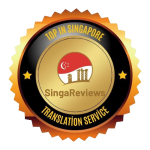
ICA Translation Services: ICA Document Translation Requirements for Permanent Residency in Singapore
What motivates people to become permanent residents (PR) in Singapore? It is not just the clean streets, low crime rates, or world-class public services. With PR status, you can access benefits such as subsidised healthcare, better job prospects, eligibility for HDB housing, and scholarships for your children. Furthermore, if you are thinking long-term, becoming a PR is a step towards citizenship and the coveted red passport, which grants visa-free travel to 177 countries. You may be planning to stay and work in Singapore for the long term, start a business, or build a stable life there. Whatever your reasons, PR status gives you the freedom to call Singapore home.
However, the ICA translation requirements for the PR application document checking process are well known for being overwhelming, particularly when preparing your documents. Imagine spending weeks gathering everything, from your birth certificate to your academic qualifications, only to discover that your documents must be translated into English. You may wonder, “How difficult could that be?” Yet, a single mistake, such as a poorly translated phrase or missing certification, could result in delays or, worse, rejection of your application.
The Immigration and Checkpoints Authority (ICA) of Singapore requires that all documents not in English must be submitted with a certified English translation for immigration applications. Acceptable translations include those provided by the embassy of the issuing country, by a notary public in Singapore or the country of issuance, or privately translated documents that are then attested by the embassy or notarised by a notary public. Self-translated or uncertified documents are not accepted, and insufficient documentation may result in application rejection.
What Are ICA Translation Requirements?
The ICA has specific guidelines for translating non-English documents submitted as part of a PR application document checking. Failure to meet these standards can lead to delays and, in some cases, the rejection of your entire submission.
For those new to certified translations and their critical role in official submissions, we have an in-depth article: Certified Translation – Things You Need to Know.
Mandatory Translation for Non-English Documents
If your documents are not in English, the ICA requires you to provide certified translations. Common documents include:
- Birth certificates
- Marriage certificates
- Academic qualifications
- Employment letters
These documents form the backbone of your PR application, and accuracy is paramount. Even a minor error in translation could alter the meaning of a clause or detail, potentially jeopardising your application.
If you want to understand the benefits and legal assurance that certified translation brings to your application process, read: What Are The Benefits Of Certified Translation?.
What Is a Certified Translation?
A certified translation is an officially recognised document that comes with a declaration verifying the translation’s accuracy and the translator’s qualifications. These certificate translation services must be produced by a public notary in the country where the document was issued or by a registered translation provider in Singapore. Fortunately, Elite Asia specialises in this. Our certified translations are designed to meet ICA’s specific standards, so you can be sure that your documents will be accepted the first time.
Certified translations include key details such as the translator’s signature, a statement of accuracy, and, where applicable, an official seal. Under ICA guidelines, submitting uncertified or self-translated documents is not permitted.
If you’re curious about the notarisation aspect or want to know how a translation becomes legal for government use, our article Notarisation of A Translated Document in Singapore – A Guide To The Process explains each step in detail.
ICA Translation of Documents for Immigration to Prepare
The documents you require will depend on your specific circumstances. In addition to standard documents such as birth and marriage certificates, you may need to translate other items, including records of legal name changes or previous marital documents. If you apply with dependents, your spouse’s or child’s documents must also comply with ICA standards.
At Elite Asia, we regularly handle translations for ICA applications and can help make the process easier. We will even remind you if critical documents are missing, ensuring nothing is overlooked.
If you’re translating documents like police reports or legal records, you may find our guide on Get Quality Certified Translation Services For Police Reports especially useful, as it covers what to look for and how to ensure acceptance.
PR Application Document Preparation Guide in Singapore
A comprehensive document preparation guide for a Singapore PR application involves organising key personal, educational, professional, and financial documents as required by the Immigration & Checkpoints Authority (ICA). The typical steps include:
- Collecting personal documents: passport-sized photos, passport, birth certificate, marriage certificate (if applicable).
- Preparing educational certificates and transcripts, professional licenses, or skill certificates.
- Gathering employment documents such as letter of employment, recent pay slips, income tax assessments for the last 3 years, and employer’s business profile if company-sponsored.
- For self-employed applicants, including business registration certificates and financial statements.
- Preparing financial documents like bank statements and IRAS Notice of Assessment.
- For family applicants, including marriage and birth certificates for spouse and children.
- Submitting all documents electronically via ICA’s e-PR portal in PDF format, making sure they are clear, complete, legible, and comply with size and format requirements.
- Paying the mandatory application fee through the portal.
The full process involves assessing eligibility, preparing and uploading detailed documents through the ICA portal, paying the non-refundable SGD 100 fee, and awaiting the outcome, which typically takes 4 to 12 months. After approval, further steps include medical check-ups and finalising PR issuance.
Do ICA Certified Translations Need to Be Recent?
One of the applicants’ most common concerns is whether older translations are acceptable. The short answer? It depends, but staying up-to-date is always the safer option.
1. Recency of Translations
Although the ICA doesn’t impose a strict expiration date on translations, it’s best to use one completed within the last six months. This minimises the risk of submitting outdated or irrelevant information.
2. When New Translations Are Necessary
A fresh translation is mandatory if your original documents have been updated to reflect a name change, a new marital status, or amended details. Submitting outdated translations may create inconsistencies and lead to avoidable application process delays.
How to Confirm ICA Compliance
If you are unsure whether your existing translation meets ICA requirements, consult a registered ICA-certified translation service in Singapore. These providers are familiar with the ICA’s latest standards and can help verify the validity of your documents.
Choosing a Reliable ICA Translation Service in Singapore
Not all translation services are created equal, and cutting corners is not an option when it comes to ICA submissions. Working with an experienced and reliable provider can make the process far smoother. Elite Asia has a 100% acceptance rate from official authorities, including the Immigration & Checkpoints Authority, the Ministry of Manpower, and the Supreme Court. We have experience in handling legal and immigration documents, as these require precise terminology and technical language.
Common Pitfalls to Avoid
Avoid using uncertified translation services or relying on automated tools like Google Translate. These may produce inaccurate or incomplete results, which can lead to complications. Also, steer clear of providers unfamiliar with ICA’s specific requirements.
To avoid all the common translation mistakes that could delay or jeopardise your application, don’t miss our comprehensive resource: Certified Translation – Things You Need to Know.
How to Vet Your Provider
Ask the translation service to confirm ICA compliance and ensure that the translated document includes all required details, such as the translator’s declaration and company seal. Doing this upfront can save you the headache of resubmitting papers later.
Professional Translations: A Must for a Smooth Process
Submitting accurate, certified translations is not just about meeting ICA requirements but also about ensuring your application process runs as smoothly as possible. Professional services help you avoid errors, prevent delays, and allow you to focus on other aspects of your PR application.
In addition to convenience, choosing a qualified translation provider demonstrates your commitment to meeting Singapore’s stringent immigration standards, which the ICA values highly.
Getting It Right the First Time
Applying for permanent residency in Singapore is a significant step, and it’s worth doing it right the first time. Accurate, certified translations play a crucial yet often overlooked role in your success. After all, why leave such an essential process to chance?
Whether you need documents translated or your spouse’s application materials prepared, working with Elite Asia, a trusted ICA translation service, ensures your paperwork is ready for review. It’s time to call in the experts. Let Elite Asia help with professional, official translation documents for your PR application.
Common Questions About ICA Translation of Documents for Immigration
For many applicants, ICA document translation raises several questions. Let’s address the most frequent ones:
Do I Need to Translate All Non-English Documents?
Yes. Any document not in English must be submitted with a certified English translation.
Who Can Certify Translated Documents?
Translated documents can be certified by professional translators who are fluent in both languages. These translators provide a signed statement confirming that the translation is accurate and complete. In many places, anyone skilled in translation can certify their work, but some countries require sworn or officially recognised translators. Sometimes, a notary public or other authorised official may also verify or notarise the certification to make it legally accepted. Translation agencies can also certify translations by validating accuracy through their professionals.
Does ICA Accept Self-Translated Documents?
No. The ICA explicitly requires translations to be carried out by a certified third party.
How Long Does the Translation Process Take?
Most certified translation services in Singapore offer a turnaround time of 2–5 business days, although urgent requests may be completed within a shorter timeframe.
What Happens If My Translation Is Rejected?
If the translation doesn’t meet ICA standards, you must resubmit, which could delay your application. The best way to avoid this issue is to choose a reputable service from the outset.
For any enquiries or quotations pertaining to our Certified Translation Services, get in touch with our localisation solutions department.










